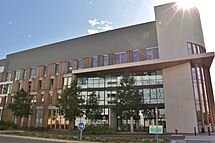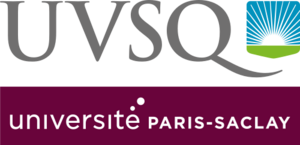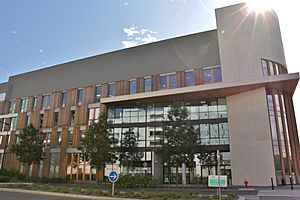University of Versailles Saint-Quentin-en-Yvelines facts for kids
|
Université Paris-Saclay
|
|

Simone Veil health research department
|
|
| Motto | La dynamique de la connaissance et de l'innovation The dynamics of knowledge and innovation |
|---|---|
| Type | Public university (EPCSP) |
| Established | 1991 |
| Endowment | €166 M |
| President | Alain Bui (since October 2017) |
| Vice-president | Alexis Constantin |
|
Administrative staff
|
752 |
| Students | 19,000 (in 2012) |
| 658 (in 2012) | |
| Address |
55 avenue de Paris - F-78035 Versailles, France
,
,
,
|
| Campus | Versailles, Saint-Quentin-en-Yvelines, Mantes-en-Yvelines, Vélizy-Villacoublay, Rambouillet, Le Chesnay, Mantes-la-Jolie, Mantes-la-Ville |
| Nickname | UVSQ |
| Affiliations | Advancity, Cosmetic Valley, Medicen, Mov'eo, Systematic Paris-Region, University of Paris-Saclay |
 |
|
The University of Versailles Saint-Quentin-en-Yvelines (UVSQ) is a public university in France. It was created in 1991. You might also hear it called Paris-Saclay University. It is located in the Yvelines department and also in Hauts-de-Seine.
UVSQ has eight campuses. The main ones are in Versailles, Saint-Quentin-en-Yvelines, Mantes-en-Yvelines, Vélizy-Villacoublay, and Rambouillet. It is one of five universities in the Academy of Versailles.
This university was one of the "new universities" opened in the Île-de-France region. It was part of a big plan to modernize French universities. In 2012, about 19,000 students attended UVSQ. The university has many teachers and researchers.
UVSQ offers courses in many subjects. These include natural science, social science, political science, engineering, technology, and medicine. It also teaches about how economics, ethics, the natural environment, and sustainable development are connected.
Contents
University History
How UVSQ Started
In 1987, a part of the Pierre and Marie Curie University opened in Versailles. This was to help more students enroll. It focused on science. Later, it joined with a law school from Paris West University Nanterre La Défense. That law school had opened two years earlier in Saint-Quentin-en-Yvelines.
In the 1990s, the French government planned to modernize higher education. They created eight new universities. The Versailles Saint-Quentin-en-Yvelines University was officially formed on July 22, 1991. It brought together the science and law centers.
Growing and Changing
In 1996, the university's rules changed. A new law meant the university had elected leaders. Michel Garnier became the first president. He set up important groups like a board of directors and a student life council.
Dominique Gentile was the second president. He helped create new parts of the university. These included a PhD School and a University Institute of Technology. The College of Medicine of Paris-Descartes University also moved to Saint-Quentin-en-Yvelines. It became part of UVSQ. More students enrolled at UVSQ between 1997 and 2002 as more people went to university in France.
From 2002 to Today
Sylvie Faucheux became president in 2002. The university updated its courses in 2004. This was part of a big change in French education.
In 2006, the CFA d'Alembert was created in Guyancourt. In 2007, the medical department (PIFO) moved to Saint-Quentin-en-Yvelines. UVSQ also became a member of UniverSud Paris. This group worked with other universities like Paris-Sud 11 University.
By 2010, the university's humanities and social sciences college split into four parts. The university also helped develop the plateau de Saclay. This area is known as "European Silicon Valley" because it has many top universities and research centers. UVSQ is a founding member of UniverSud Paris. It supports scientific teamwork and the Paris-Saclay research group.
Student Numbers Over Time
The number of students at UVSQ has grown a lot. It more than doubled between 1993 and 2013.
| 1993 | 1995 | 1998 | 1999 | 2000 | 2001 | 2002 | 2003 | 2004 | 2005 | 2006 | 2007 | 2008 | 2009 | 2010 | 2011 | 2012 | 2013 |
|---|---|---|---|---|---|---|---|---|---|---|---|---|---|---|---|---|---|
| 7,209 | 9,322 | 10,029 | 10,200 | 10,579 | 10,719 | 12,769 | 13,295 | 14,226 | 14,765 | 14,450 | 13,992 | 13,654 | 14,623 | 15,142 | 15,420 | 16,126 | 16,925 |
In 2013-2014, UVSQ had about 9,600 undergraduate students. It also had 6,600 graduate students and 700 post-graduate students.
The most popular subjects were law, economics, and management. These made up 37% of all students in 2013. Science and engineering were also very popular.
More than half of the undergraduate students are female (60%). However, in some engineering and technology programs, most students are male. Many students come from the Yvelines department, especially around Versailles and Saint-Quentin.
UVSQ welcomes many international students. In 2010, there were 2,400 students from 72 different countries. This was 13.3% of all UVSQ students. Almost half of the PhD students (45%) were from other countries.
University Campuses and Buildings
Main Campuses
The university has four main campuses. These are in Versailles, Saint-Quentin-en-Yvelines, Mantes-en-Yvelines, and Vélizy-Villacoublay / Rambouillet. In total, UVSQ has eight campuses across two departments and seven towns. They cover a huge area of 160,000 square meters.
- At the Versailles campus, you'll find the science college and ISTY (the computer science college).
- The Saint-Quentin-en-Yvelines campus has law, political science, social sciences, medical research, and the universe observatory.
- Another science campus is in Le Chesnay.
- Vélizy-Villacoublay has the IUT of Vélizy. Rambouillet is also part of this.
- The Mantes-la-Jolie campus houses the IUT of Mantes-en-Yvelines.
- Mantes-la-Ville has the mechatronics college of ISTY.
Medical and Research Centers
The Unité de formation et de recherche médicale Paris Île-de-France Ouest (PIFO) is a medical department of UVSQ. It is located in Guyancourt. It works with several hospitals, including Raymond Poincaré University Hospital and Ambroise-Paré Hospital. Two schools for midwifery are also part of PIFO.
The Observatory
The OVSQ is very important for UVSQ. It focuses on sustainable development. It is on the Saint-Quentin-en-Yvelines campus. The OVSQ studies environmental changes, including how they affect health and society. It works on space programs with the French and European space agencies.
The OVSQ helps with international projects that watch the atmosphere. It also creates tools to observe natural and social events. To prepare students for careers in sustainable development, OVSQ offers courses that combine economics, humanities, and environmental studies. The observatory helps UVSQ be a key part of the Climate-Environment-Energy center of the Paris-Saclay Campus.
Advanced Study Schools
The university has special schools for PhD students. These schools help students with their advanced research degrees. In 2009, 102 Doctorates were awarded.
- The Cultures, Regulations, Institutions and Territories PhD graduate school studies social sciences, humanities, law, and political sciences.
- The Genome Organizations PhD graduate school focuses on biology and genomics. It also connects with mathematics, computer science, physics, and chemistry.
- The Environmental Science in Ile de France PhD graduate school looks at the physical, chemical, and biological balance of Earth's environment.
- The Science and Technology of Versailles PhD graduate school studies chemistry, physics, mathematics, and engineering.
- The public health PhD graduate school works with other universities. It has labs that research epidemiology and population health.
University Libraries
UVSQ has several libraries. The main library opened in June 2002. It is very large, with 8400 square meters, and has over 100,000 books. In 2005, another big library opened in Saint-Quentin-en-Yvelines. It has 7500 square meters and 1,100 reading spots.
In September 2011, a new library opened on the science campus in Versailles. In total, the university has six academic libraries. They are also located in Vélizy, Boulogne-Billancourt, Rambouillet, and Mantes. These libraries hold about 200,000 books, 5,000 digital books, and 26,000 magazines and newspapers.
How UVSQ is Run
University Leadership
Like other public universities in France, UVSQ is led by a president. The president is chosen by a board of directors. The president is also part of three university councils. Staff members and outside representatives serve four-year terms on these boards. Student members are elected for two years.
- The board of directors has 30 members. They decide the university's main goals and manage its budget.
- The academic and university life council has 40 members. They handle courses and training.
- The scientific council has 40 members. They are in charge of research and development.
Past Presidents
Since it started in 1991, UVSQ has had six presidents:
- Michel Garnier was the first president (1991-1997). He was a professor of geophysics.
- Dominique Gentile served from 1997 to 2002. He was a professor of physical sciences.
- Sylvie Faucheux was president from 2002 to 2012. She is an expert in environmental economics.
- Jean-Luc Vayssière, a Biology Professor, was president from 2012 to April 2016.
- Didier Guillemot, a doctor, was president from May 2016 to September 2017.
- Alain Bui, also a doctor, has been the president since October 2017.
University Funding
In 2011, the university's budget was 166 million euros. This was a big increase from previous years. The budget helps pay for everything the university does.
UVSQ Foundation
The UVSQ Foundation helps the university in Yvelines. It supports high-quality education and research. The foundation works closely with other top schools and research groups.
The foundation helps UVSQ with training programs and research. It also supports projects related to social responsibility. It was created in May 2010 by nine founding members. These include the university and several companies like PSA Peugeot Citroën and Renault. The foundation's projects include scholarships for young talent and developing the university libraries.
What Students Learn and Research
University Rankings
UVSQ is recognized globally. Here are some of its rankings:
| University rankings | |
|---|---|
| Global – Overall | |
| ARWU World | 401-500 (2019) |
| CWTS World | 883 (2019) |
| Sources | Ranking |
|---|---|
| CWUR | 310 |
| THE | 301-350 |
| THE (Young University Rankings) | 42 |
| Shanghai Ranking | 401-500 |
| QS (medicine) | 451-500 |
University Departments
UVSQ has ten main parts. These include six faculties, two University Institutes of Technology, one School of Engineering, and one Observatory.
| French name | What it Teaches | Location | Subjects | Number of students |
|---|---|---|---|---|
| UFR des sciences | Science | Versailles and Le Chesnay | biology, physics, chemistry, mathematics, computer science | 3500 |
| Faculté de droit et de science politique (DSP) | Law and Political Science | Saint-Quentin-en-Yvelines | law and political science | 3000 |
| UFR des sciences de la santé Simone Veil | Health Sciences | Saint-Quentin-en-Yvelines | medicine, dentistry, pharmacy, midwife, psychotherapy, occupational therapy, physical therapy, nursing | 2500 |
| UFR des sciences sociales | Social Science | Saint-Quentin-en-Yvelines | economy, social and economic administration, geography and sociology | 2000 |
| Institut d'études culturelles et internationales (IECI) | Cultural and International Studies | Saint-Quentin-en-Yvelines | history, literature and languages | 1600 |
| Institut supérieur de management (ISM) | Management | Saint-Quentin-en-Yvelines | management science, information science, communication and educational science | 1400 |
| IUT de Vélizy - Rambouillet | University Institute of Technology of Vélizy and Rambouillet | Vélizy-Villacoublay and Rambouillet | computer science, electric systems, telecommunication, networks, multimedia | 1300 |
| IUT de Mantes en Yvelines | University Institute of Technology of Mantes en Yvelines | Mantes-la-Jolie | civil, industrial, mechanical, computer and mechatronics engineering, management, business, security and natural environment | 700 |
| Institut des sciences et techniques des Yvelines (ISTY) | Yvelines Institute of Sciences and Technique | Vélizy-Villacoublay and Mantes-la-Ville | computer engineering and mechatronics engineering | 180 |
| Observatoire de Versailles Saint-Quentin-en-Yvelines (OVSQ) | Versailles Saint-Quentin-en-Yvelines Observatory | Saint-Quentin-en-Yvelines | earth science, astronomy, natural environment, sustainable development, management, system science and social science |
UVSQ also manages three schools with other institutions:
| French name | What it Teaches | Location | Subjects | Number of students | Partners |
|---|---|---|---|---|---|
| École supérieure du professorat et de l'éducation de l'académie de Versailles | Higher School of Teaching and Education of Versailles Academy | Versailles and Saint-Quentin-en-Yvelines | education | 5000 | Cergy-Pontoise University, University of Évry Val d'Essonne, Paris West University Nanterre La Défense, University of Paris-Sud, Institut national supérieur de formation et de recherche pour l’éducation des jeunes handicapés et les enseignements adaptés, Académie de Versailles |
| CFA d'Alembert | d'Alembert Training Centre for Apprentices | Saint-Quentin-en-Yvelines | health, natural environment, civil engineering, chemistry, real estate public law, communication, risk management | 300 | Versailles-Val-d'Oise-Yvelines Chamber of Commerce |
| Sciences Po Saint-Germain-en-Laye | Political Science Saint-Germain-en-Laye | Saint-Germain-en-Laye | political science, public law, history, economy sociology | 82 | Cergy-Pontoise University |
Types of Courses
In 2012, UVSQ offered many different courses. These included 50 Bachelor's degree programs and 95 Master's degree programs. They also had special university diplomas and engineering degrees. Students could even take 10 E-learning (online) courses.
Bachelor's degrees were offered in four main areas. These were arts-humanities-languages, law-economy-management, humanities and social sciences, and science-technology-health. Master's degrees were available in five areas, adding environmental science-territory and economics.
University Research
UVSQ has 35 laboratories where research happens. Twelve of these are connected to the French National Centre for Scientific Research. The university has about 950 researchers and 715 PhD students.
Research is done in six main departments:
- Chemistry, Physics, Materials, Renewable Energy: This department studies materials and complex systems.
- Environment and Sustainable Development: This covers science, humanities, economics, and medicine related to the environment.
- Mathematics, Computer Science, Engineering Sciences: This department focuses on math, computer science, and systems engineering.
- Biology and Health: About 300 researchers and 1,200 medical students work here. They research biology, medicine, and epidemiology. They work with several hospitals.
- Cultures, Humanities and Sciences: This department studies languages, cultures, business, and social sciences.
- Institutions and Organizations: This focuses on management, law, and political science.
The Institut Pierre-Simon Laplace is a research institute in Guyancourt. It studies global environmental sciences. Three of its laboratories are partly managed by UVSQ. These include the terrestrial and planetary study center and the climate science and environment laboratory.
Notable Teachers and Alumni
Many important people have taught at UVSQ. These include sociologists like Roland Guillon and Laurent Mucchielli. Historians like Bernard Cottret and Christian Delporte have also taught there. In science, Rémy Card, who created the ext2 file system, and Gérard Férey, a famous chemist, have been teachers.
Honorary Degrees
UVSQ gives special "Doctors honoris causa" degrees to important people. In 2011, six people received this honor. They included Andrew Abbott (a sociology teacher), George Bermann (an international law teacher), and Amos Gitai (a filmmaker).
University Image
The university's logo shows a white sunrise on a green earth. This represents sustainable development, which is a key focus for UVSQ. The university also has a magazine called T'DACtu and a monthly video diary called UVSQ & Vous.
Student Life at UVSQ
Student Support Services
Student Life Department
The Direction de la Vie Étudiante (DVE) helps students in many ways. It guides new international students and helps students find housing. It also supports student activities like cultural events, sports, and student clubs. The DVE manages places where students can eat, relax, and study. It also offers discounts for cultural events like movies and concerts. Students can join over 20 sports activities on different campuses.
CROUS Services
The CROUS (Regional Centers for University and School Services) helps improve student life. It helps students find housing near their universities. In 2011, over 8,500 students lived in CROUS residences. CROUS also gives scholarships to students and has staff who can help with problems. There are CROUS restaurants on campus where students can get meals at lower prices. CROUS also helps students find jobs or internships.
Financial Help
Students can apply for financial aid for the next school year. This aid depends on things like family income and how far they live from campus. There is also help for students preparing for public service exams. Students can even apply for bank loans that are guaranteed by the French government.
Student Clubs and Activities
About 30 student clubs offer activities in many areas. These include science, social sciences, law, medicine, and humanitarian work. It's easy to join a club or even start a new one. Being in a club lets students create and develop projects. Clubs can apply for money from the FSDIE commission. This funding comes partly from student registration fees.
To give students a place to meet and work on projects, a student house opened in 2013 on the Versailles campus. It's a large building with space for activities, a multipurpose room, an art room, a cafeteria, and offices for student clubs.
International Connections
UVSQ has many international connections. It works with programs like Erasmus and has partnerships with about 230 universities worldwide. In 2010, the university welcomed 330 international students.
The university is an active member of the University of the Arctic (UArctic). UArctic is a network of over 200 universities and organizations. They work together to promote education and research in the Arctic region. UVSQ also takes part in UArctic's north2north program. This program allows students to study in different parts of the North.
See also
 In Spanish: Universidad de Versailles Saint Quentin en Yvelines para niños
In Spanish: Universidad de Versailles Saint Quentin en Yvelines para niños


